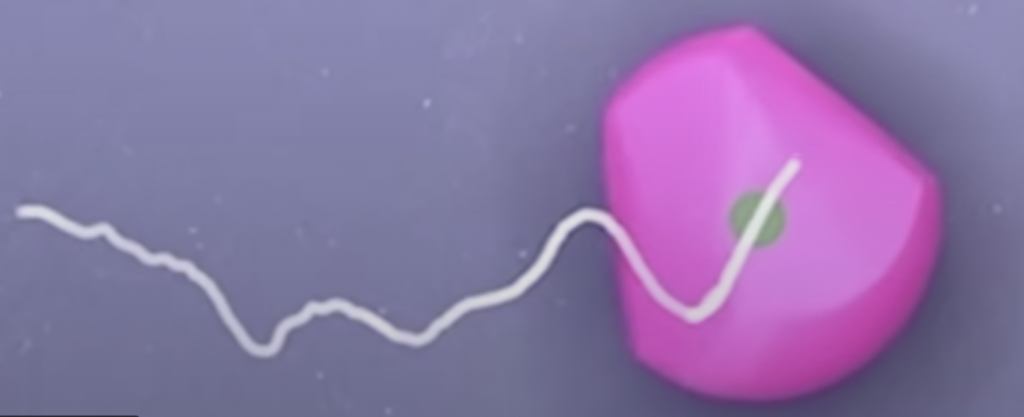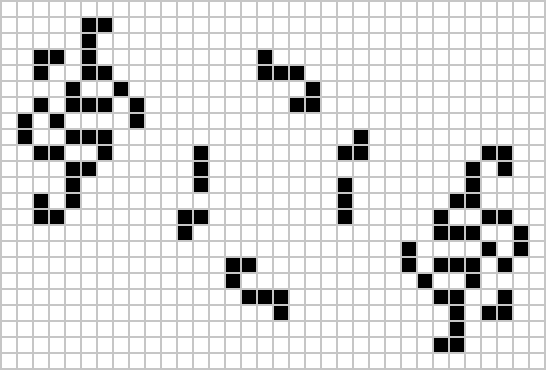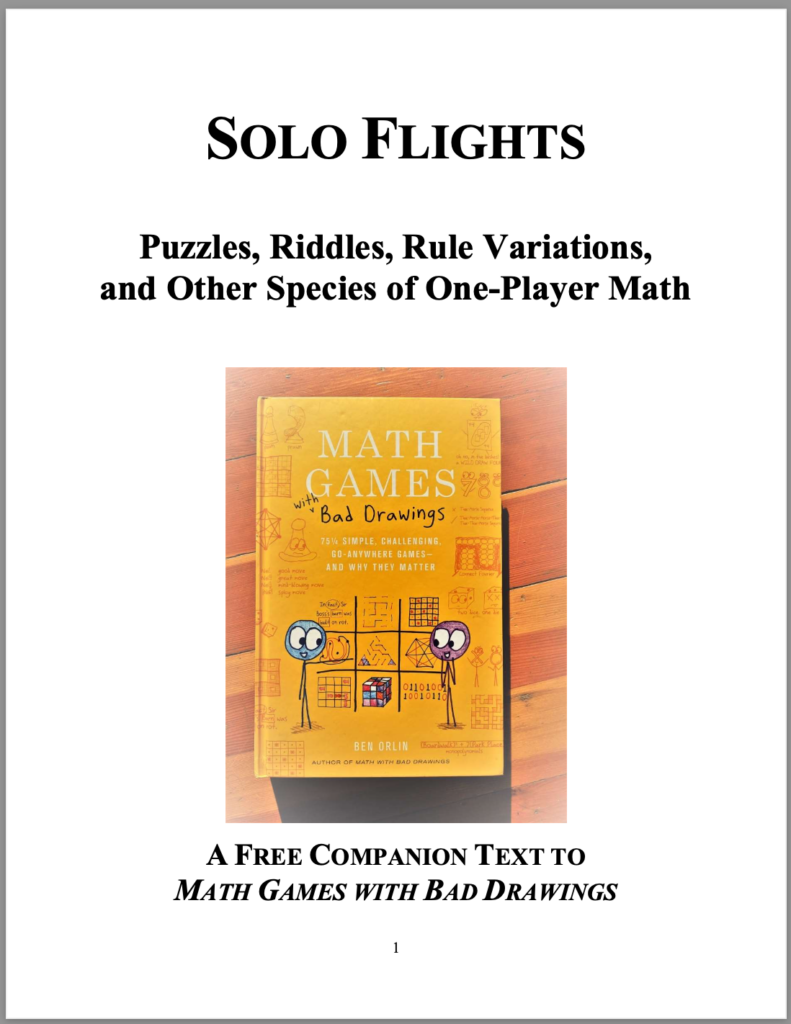Here’s a round-up of a few newsy things we didn’t cover on the site in the month of December.
You're reading: News Roundup
Aperiodical News Roundup – November 2023
Here’s a selection of mathematical news from the month of November that we didn’t otherwise mention on the site.
Proof News
The dream team of Tim Gowers, Ben Green, Freddie Manners and Terence Tao (pictured above) claim to have solved the polynomial Freiman-Ruzsa conjecture (originally conjectured by Hungarian mathematician Katalin Marton), which is described by Gil Kalai in this blog post as ‘the holy grail of additive combinatorics’. (via Terence Tao)
It’s claimed that the board game Othello has been solved: according to this arXiv paper, perfect play leads to a draw. (via Stephen Brooks)
Maths/politics
The UK Government has pledged “support to establish a National Academy focussed on mathematical sciences”. There has been a project to set up such an Academy as a recommendation from the Bond Review ‘The era of mathematics‘ in 2018, and it’s currently in a proto-setup phase.
Algorithmic trading firm XTX Markets has launched a $10m fund “designed to spur the creation of a publicly-shared AI model capable of winning a gold medal in the International Mathematical Olympiad”.
And finally
Ben Orlin has released a few interactive online versions of games from his book “Math Games With Bad Drawings”.
Aperiodical News Roundup – October 2023
Here’s a round-up of a few things that happened this month that we didn’t otherwise cover here.
The Salem Prize for 2023, given annually to young mathematicians judged to have done outstanding work on harmonic analysis and related topics, has been awarded to Sarah Peluse and Julian Sahasrabudhe. (via Terence Tao)
According to this recent arXiv paper, data from 350,757 coin flips supports Persi Diaconis’ model of coin tossing, which estimates the probability of a coin landing on the same side it started at a surprising 51%. (via Alex Corner, Sheffield Hallam University)
Statistician C. R. Rao, who pioneered powerful statistical methods that underpin modern scientific data analyses, has died. (via Raul Jimenez)
And finally, the newly* discovered aperiodic monotile, which we won’t stop going on about ever, has been chosen as one of Time’s 200 Best Inventions of 2023 (via the European Mathematical Society).
Aperiodical News Roundup – September 2023
Here’s a roundup of some things that happened in September 2023 that you may have missed.
Aperiodical News Roundup – August 2023
Here’s a selection of mathematical stories that crossed our desk in August.
Maths Research News
Researchers have discovered that a shape can be designed to trace almost any infinite periodic trajectory when rolling down a slope, as seen in this Nature.com video (via Jeroen van Dorp)

A new diamond open access journal, Innovations in Graph Theory, has been founded. The first issue of the journal is expected to appear in 2024. (via Peter Cameron)
And in important publication news for silly season: Erik Demaine and Martin Demaine have achieved “the true ideal of an unordered set of equal authors, where every author comes first”. Their paper Every Author as First Author proposes a new standard for writing author names on papers and in bibliographies, which places every author as a first author, with the names all superimposed on top of each other, including details of the \namestack LaTeX command for this purpose. The results are predictably hilarious (see below). (via Nalini Joshi)
Other News
Alison Kiddle has been posting daily conversation prompts involving LEGO to stimulate mathematical thinking on their blog every day in August, and people have been responding on Twitter and Mastodon.
Mathematician and logician Peter Aczel has died, as has Ian G. Macdonald (who introduced Macdonald polynomials).
Aperiodical News Roundup – July 2023
Here’s some mathematical news that didn’t make it on to the site otherwise this month.
Maths News
There’s been more abc conjecture drama: Peter Scholze and Jakob Stix are in line for a ¥140m (around £766k) prize for their paper pointing out the flaw in Mochizuki’s claimed abc proof – if they publish it in a journal.
A period 19 oscillator has been found in Conway’s game of life – the discussion thread on ConwayLife just gives it as a series of coordinates, but it already has an entry on LifeWiki, where it’s called ‘Cribbage’. (via Isaac Grosof)
Then, a week later, the first ever period 41 oscillator was also found! Excitingly named 204P41 (consisting of 204 cells) it’s led to another discovery – it looks like we now know how to make oscillators with any period, meaning Game of Life is omniperiodic. Since 2013 we’ve known all periods above 43 were possible, and this fills a gap in this excellent table.
Lean’s mathlib has been completely ported to Lean4 – if you’re familiar with proof assistants, you may find this news exciting or significant. Here’s a video showing off what that looks like. Meanwhile, the Lean Focused Research Organization has been set up to “advance the formal mathematics revolution”. (via @leanprover@functional.cafe)
Events and Organisations
Inclusion/Exclusion, a justice and maths blog, has posted an open letter to the MAA about holding MathFest in Florida, requesting an option for online participation due to the state’s recent draconian law changes. It pulls ε punches:
Regardless of any in-person safeguards that MAA may put in place, this year’s MathFest will not be a safe event for trans people, for undocumented immigrants, or for many other members of our community, including disabled people. Therefore, our most urgent request is that you provide an online participation option.
Excerpt from the open letter
If π approximation day on 22/7 got you thinking about your plans for the next actual π day, you might find it useful to know that the International Day of Mathematics 2024 theme is Playing With Math. From their website, “In 2024 we want to celebrate mathematical games, puzzles and other entertaining activities, but also “playing” with mathematics itself, exploring, experimenting, and discovering.”
Speaking of mathematical games, Ben Orlin has released a book of solitaire games as a follow-up to his “Math Games with Bad Drawings”. It’s available for free on his website as a PDF, and therefore weighs infinity less than the actual book it’s a follow-up to, which is so huge it’s collapsed into a black hole under its own mass. (via Patrick Honner)
And finally: Tim Wall, the Australian group theorist, has died. According to his profile on the Australian Academy of Science website, Wall “has made highly significant and original contributions to the development of Algebra, in particular to the Theory of Groups. […] He has always instinctingly given of his ideas to his collaborators and younger colleagues.” Thanks Tim!
Aperiodical News Roundup – May & June 2023
Maths news didn’t stop coming this month, and if you missed it, here was our coverage of the new Spectre aperiodic monotile, an improvement on the previous monotile discovery. Here’s some other news that happened in May and June which we didn’t otherwise cover here.
Vladimir Drinfeld and Shing-Tung Yau have been awarded the 2023 Shaw Prize for their contributions related to mathematical physics, to arithmetic geometry, differential geometry and Kähler geometry. (via the European Mathematical Society)
According to provisional 2023 entry data, mathematics remains the most popular choice at A level in England and Wales this year.
Ticket sales continue apace for this year’s TMiP maths communication conference, and in the meantime it’s inspired a nascent equivalent network for math communicators in the US – sign up if you’re an American math communicator who WLTM others.
There’s been a moderation strike at Stack Overflow, which includes Math Overflow, in response to AI-generated content policy changes. “Striking community members will refrain from moderating and curating content, including casting flags, and critical community-driven anti-spam and quality control infrastructure will be shut down.” (via theHigherGeometer)
There’s a free online IMA event, including a talk called ‘How Maths Helped Me to Annoy My Insurance Company’ by Victoria Sánchez Muñoz taking place at 5pm on Thursday 13 July.
Obviously the most important news this month is the new Rubik’s cube world record – it’s now possible for a human to solve the cube in as little as 3.13 seconds (furious they’ve skipped π seconds) and the GIF included in the article shows just how impressive the feat was.
And finally, this Nature article outlines how deep reinforcement learning has discovered faster sorting algorithms. Algorithms such as sorting or hashing are everywhere – used trillions of times a day, according to the article. This means even small efficiency improvements can be huge because of the scale, but these algorithms are so well-studied that further efficiency was difficult to imagine. DeepMind trained a deep reinforcement agent, AlphaDev, to work from scratch using assembly code to attempt to find a better sorting routine. The researchers reverse engineered the algorithms found by AlphaDev to C++ and found these led to performance improvements of “up to 70% for sequences of a length of five and roughly 1.7% for sequences exceeding 250,000 elements”. The Nature paper has details of the algorithmic improvements. The improved algorithms have already been implemented into the LLVM libc++ standard sorting library.


![Screenshot from paper: "being equal. In our own writing, we try to avoid this practice, and instead write all authors' surnames whenever citing a paper, e.g., "X, Y, and Z [#]". But this workaround becomes impractical for references with over a dozen authors, such as some of our papers (*incomprehensible black smear of overlaid names* 2020; *incomprehensible black smear* 2020) or some papers in astronomy (*incomprehensible black smear* 2006) and biology (*incomprehensible black smear* 2001)."](https://aperiodical.com/wp-content/uploads/2023/08/image-9.png)


